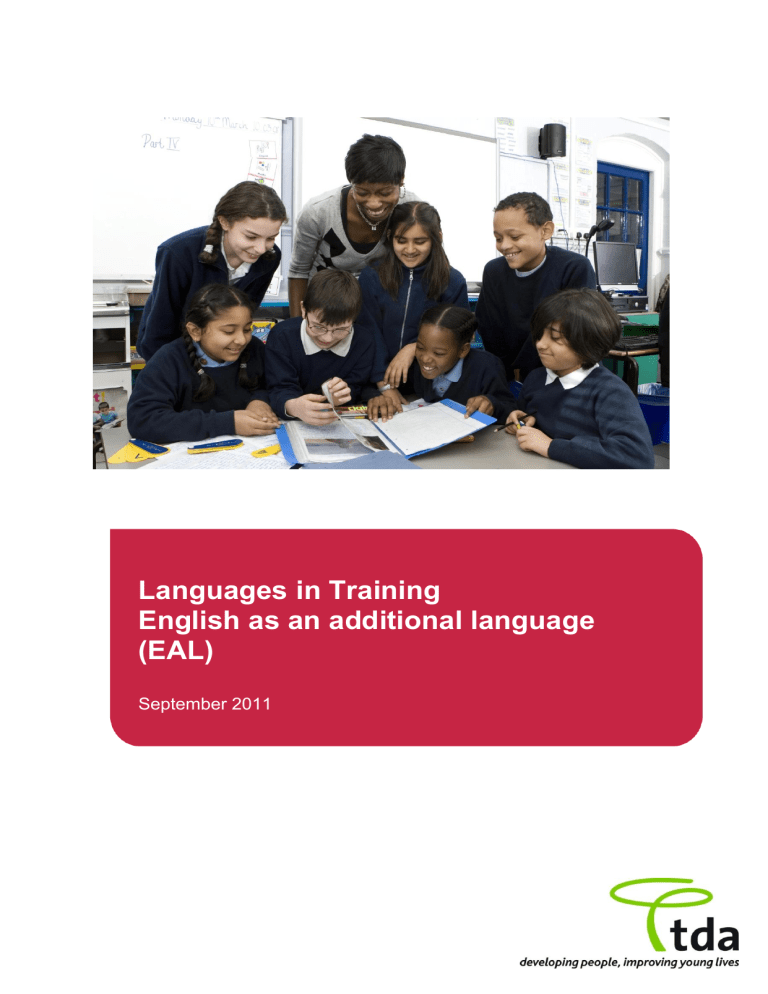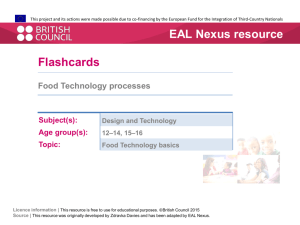Leading Partners in EAL

Languages in Training
English as an additional language
(EAL)
September 2011
“Many of our children arrive at school with complicated and interrupted histories in education. To meet their needs we have to first understand their starting points and then find a suitable approach to their personal, linguistic and academic development. The first step for us is to know the learner. We have developed rigorous systems to find out all we can about them at the earliest opportunity. The next step is to identify an approach to learning based on that knowledge. The learning process is built on experience and scaffolded by talk. This allows the new arrival to engage with learning at the earliest opportunity and to experience success.”
Advice for others? “Build a wide range of expertise at all levels and look for evidence of learning in all si tuations.”
Karen Carter, Headteacher, Cheetham Hill Church of England Community School
Taken from ‘Provision for new arrivals learning English as an additional language’, Ofsted,
May 2011
Background
Research has shown that the level of specialist expertise within the teaching workforce for pupils with English as an additional language (EAL) is currently not sufficient to meet demand due to high levels of immigration in recent years. The expertise that is available within the system is patchy and centres around certain geographical areas.
There has been a consistent increase in the population of EAL learners in England and, with it, demand for different types of EAL provision linked to new patterns of immigration and migration. The 2008 school census indicates that EAL pupil numbers rose by approximately
25 per cent between 2004 and 2008, while the number of specialists EAL teachers has increased by just 8 per cent. At the same time, the Training and Development Agency for
Schools’ (TDA) newly qualified teacher (NQT) survey indicates that only 34 per cent of trainees felt their training in EAL was good or very good in 2008.
The TDA is looking to work with school partnerships to develop and implement local strategies appropriate to their local context to raise skill levels within schools and raise the profile of EAL amongst middle and senior managers in schools and training providers
Benefits of engagement
Participation in the project will allow schools within the school partnership to:
Improve attainment for their EAL learners and in schools within the surrounding area
Develop kudos and a strong reputation as a school in this key priority area
Strengthen links with initial teacher training (ITT) providers and be part of national networks
Provide opportunities to develop new income streams in EAL CPD.
How does a school partnership engage?
In order to engage in the project the school partnership will need to:
Review the distribution of EAL knowledge and expertise within the school partnership
Identify development and training needs for EAL within the school partnership
Deliver a training and development action plan for the partnership and for the local area for EAL in partnership with the TDA
Offer support structures within the school partnership for EAL
Work with local ITT providers to improve the quality of training for trainees in this area.
Work with schools locally and nationally outside of the school partnership to improve the quality EAL provision
What is currently on offer from TDA?
Leading Partners in EAL project
ITT plays a key role in ensuring that all new teachers are equipped with the skills and knowledge required for the classroom. Key to the success of this training is the opportunity for trainees to observe teaching, receive support and feedback from expert practitioners and develop their attention for learning based upon the needs of the classes which they are teaching. Central to the provision of these elements is the school in which the training is centred.
The TDA is currently seeking to support and develop rich partnerships between training providers and partner schools to: develop and enhance trainees’ and teachers’ knowledge of teaching EAL pupils demonstrate how schools’ involvement in training can support the learning, access and achievement of EAL pupils
demonstrate how schools can organise effective training environments which also support pupils’ EAL learning
further develop and strengthen partnership between providers of initial teacher training and leading practitioners in schools, and
build coherence across training programmes in relation to support for EAL pupils, including more coherent approaches to EAL across subjects and improved integration of school and centre-based training.
We are currently inviting proposals for grant funding of £5,000 per consortia of ITT providers and partner schools for projects of this kind. For grant specification or further information please e-mail languages@tda.gov.uk
Contact
Name: Ben Rockliffe
E-mail address: languages@tda.gov.uk
Training and Development Agency for Schools
Piccadilly Gate
Store Street
Manchester
M1 2WD www.tda.gov.uk
Publications line 0845 6060 323 TDA switchboard 0870 4960 123
© TDA 2011




